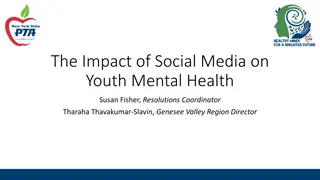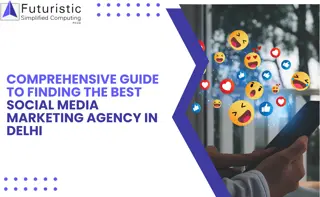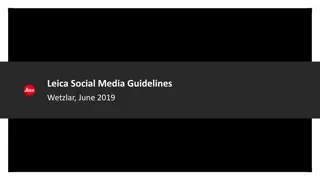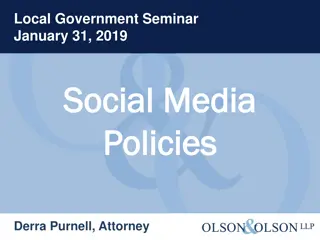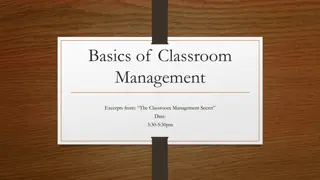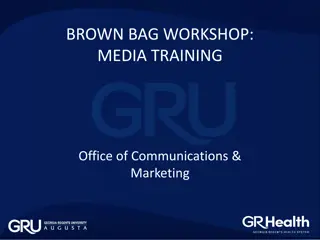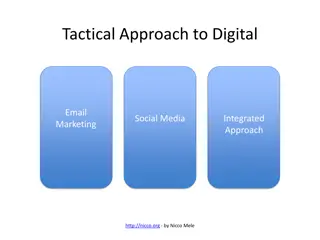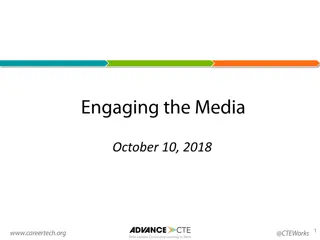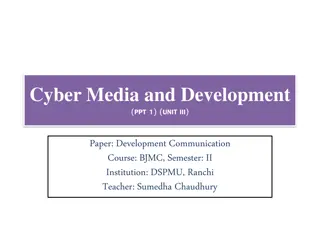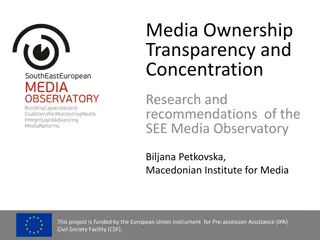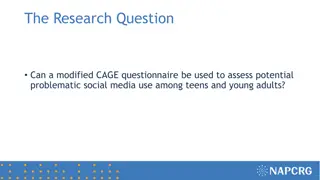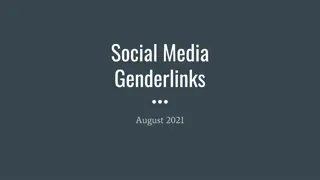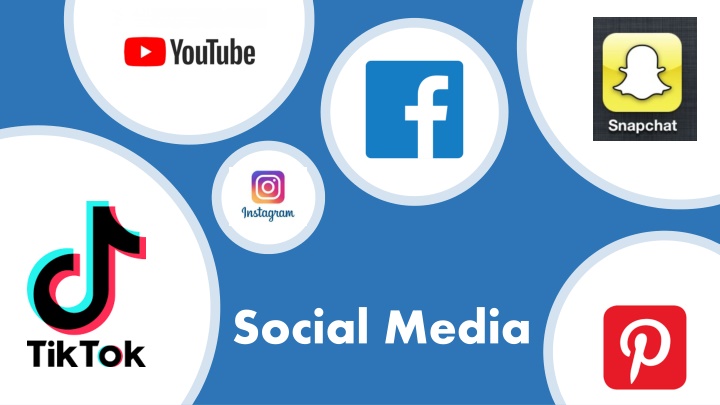
Impact of Social Media on Mental Health and Well-being
Learn about the risks and benefits of social media, how it affects mental health, especially in teens, and steps towards safe social media usage. Discover why pre-teens and teenagers are vulnerable, random facts on youth and social media, positives of connecting through social platforms, and steps to ensure a safe online experience. Understand the importance of moderation, offline engagement, and accountable behavior in the digital world.
Download Presentation

Please find below an Image/Link to download the presentation.
The content on the website is provided AS IS for your information and personal use only. It may not be sold, licensed, or shared on other websites without obtaining consent from the author. If you encounter any issues during the download, it is possible that the publisher has removed the file from their server.
You are allowed to download the files provided on this website for personal or commercial use, subject to the condition that they are used lawfully. All files are the property of their respective owners.
The content on the website is provided AS IS for your information and personal use only. It may not be sold, licensed, or shared on other websites without obtaining consent from the author.
E N D
Presentation Transcript
Lets talk about #SafeSocial. - Overview Overview- Risks of using Social Media Positives to Social Media Steps towards #SafeSocial
Risks of using Social Media Feeling more anxious, depressed, jealous, stressed, overwhelmed, or lonely Comparing yourself Seeing traumatic or violent imagery Scams with others Harassment and cyberbullying Internet predators and catfishing they exist! Hard time focusing Addiction
Pre-teens & teenagers are most at-risk group. Why are teens so at-risk? Elevated social comparison (peer-to-peer comparison) Undeveloped brains Little education around practicing Safe Social Fewer social supports
Social media can affect your mental health. Random facts Youth who frequently use social media increase their risk of depression by 27%. Teens who spend more time on non-screen activities (i.e. sports, exercise, or any other in-person activities) are less likely to report any mental health issues. Using 7+ media platforms has correlated with a higher risk of anxiety and depression in adolescents. Social media can be a distraction. Students in college have reported procrastinating for many hours by watching YouTube or scrolling through other social media platforms.
Connect with friends / meet new people Positives to Social Media Communication and sense of community News consumption and awareness Job search Personal branding
Steps toward #SafeSocial 1 2 3 4 5 Build awareness & understanding Moderate your consumption Build offline Model good behavior Hold responsible parties accountable soft skills
Like most things in life, consider the pros/cons of social media! CONS PROS Ease of communication with friends/family who you are unable to talk to in person because of distance (i.e., out of state/out of country) Social stimulation (video games/chats/friend networks) Use for job search/researching colleges/finding groups of people with like-minded interests Limits risks. It s easier to keep your guard up when texting You can say things you wouldn t normally say in person Can make friends, build relationships Can promote a feeling of inclusion, giving greater access to more friends Can look back on memories from things you ve posted in the past Potential benefit in the process of learning and accessing information Allows for the expression of creativity Can expose teens to current events Can provide teens valuable support, especially those who are already isolated due to disability or chronic illness An easy means to display your interests and talents digitally Research tool to explore interests and learn new things Provides visual entertainment (TikTok and YouTube) Can use social media to seek academic help Can build your use and knowledge of technical skills Opportunity to present a fake image of who you really are Unrealistic view of self and/or other people s lives Effect on body image Expect perfect view of self? Makes you vulnerable to internet predators Can increase feelings of loneliness, depression, anxiety, poor body image, and lower self esteem You learn to communicate with others through a screen rather than in person. You miss out on skills needed to communicate directly in person. These are complex skills. You can be hurtful to another without knowing it since you can t see their expressions or the effect you are having with your words Can expose you to internet bullying Simple things like calling someone on the phone now seems too intense , scary and uncomfortable. Girls who feel insecure will often use social media to intimidate, spread false rumors, or put people down so they feel better. Boys challenge each other with dares or risky behaviors. You can get hyper-focused on the number of likes you get. Cyberbullying and harassment. Teens are impulsive by nature. Some are at risk of sharing intimate photos or highly personal stories which become permanently held data (not always retrievable). You or younger siblings could be in danger of seeing things on the internet that you are developmentally and emotionally not prepared to handle How do you feel if you present a profile or online persona that doesn t really represent who you really are? It can be exhausting to always have to work to appear perfect . Social Anxiety can increase. Can decrease the quality of your sleep Can be distracting
Healthy ways to use Social Media Unhealthy ways to use Social Media Limit usage to no more than 3 hours/day Bedroom off limits to social media (rest!) Maintain healthy boundaries block others who are not having a positive influence Question posts from someone who is an impostor and may not who they say they are Parents are key in setting a good example of healthy computer use. They can set up technology free hours or designate a place in the home that is technology free. Establish a rule of no phone use in the car. This is an important time for students and parents to TALK with one another, without interruption. Having a parent tech free can help their child feel more secure. Use social media but make sure it doesn t take away from your opportunities to communicate face-to-face with your friends and family members. If possible, keep cellphones and tablets out of your bedroom Are you addicted to social media? Is it keeping you from taking risks - developing IN PERSON communication skills, learning a hobby, playing a sport, learning to play an instrument, playing outside, etc ? Using social media to gossip, spread rumors or false information Is it keeping you from getting healthy sleep at night? Is it contributing to anxiety/depression? Do you get seriously upset when you can t log on or can t check your social media sites multiple times a day? Are you dependent on looking at your phone every hour? Create your own list of healthy & unhealthy ways YOU use Social Media.
Resources Common Sense Media: https://www.commonsensemedia.org/blog/16-apps-and-websites- kids-are-heading-to-after-facebook Cyberbullying Research Center: https://cyberbullying.org/smart-social-networking Safe Search Kids: https://www.safesearchkids.com/a-teens-guide-to-social-media- safety/#.YZa6f2DMKUk #SafeSocial: https://safesocialmedia.co/



